八年级上册英语unit1单词及语法讲解
八年级上册英语unit1-单词及语法讲解

❖ Maybe they’ll go skateboarding.
❖ He may know the answer.
❖ 15. although = though 虽然
❖ Although he’s ill, he goes to school on time
❖ 虽然他生病了, 但他还是准时上学。
❖ She eats a lot of chocolate, although she is very fat. 虽然她很胖大家,好但她却吃许多的巧克力8 。
❖ time表示不可数名词,意为“时间”。 表示可 数名词,意为“次数,倍数”
❖ What time is it?
❖ I go to the movies three times a week. ❖ 注意“次数”的表达方法 ❖ 一次 once, 两次 twice, ❖ 三次或三次以上用基数词加上times: ❖ three times、five times、
❖
我将在这呆一段时间。
❖
He worked for that company for some time.
❖
他为那家电脑公司工作了一阵子。
❖ (3) some times是名词词组,意为“几次,几倍”
❖ I met him some times in the street last month.
❖
上个月我在街上遇到他好几次了。
I want you to help me with my math. 我想要你帮我学数学。
有很多动词后面用这种结构做动词的复合宾语:
ask sb. to do sth. 叫某人做某事
tell sb. to do sth. 告诉某人去做某事
八年级上册英语第一单元单词笔记

八年级上册英语第一单元单词笔记一、anyone ['eniwʌn] pron. 任何人。
1. 用法:用于疑问句和否定句中,代替someone。
例如:Did you see anyonein the room?(你在房间里看到任何人了吗?)2. 拓展:在肯定句中通常用someone,但anyone也可用于肯定句中表示“任何人”的意思,强调个体。
二、anywhere ['eniweə(r)] adv. 在任何地方;无论何处。
1. 用法:常与否定词或疑问词连用。
例如:I can't find my book anywhere.(我到处都找不到我的书。
)2. 辨析:与somewhere的区别。
somewhere用于肯定句,表示“某个地方”;anywhere用于否定句和疑问句。
三、wonderful ['wʌndəfl] adj. 精彩的;绝妙的。
1. 用法:用来形容事物非常好、令人赞叹。
例如:We had a wonderful time at the party.(我们在聚会上玩得很开心。
)2. 拓展:同义词有excellent, great等。
四、few [fjuː] adj. & pron. 不多;很少。
1. 用法:- 作形容词时,修饰可数名词复数,表示数量少。
例如:There are few students in the classroom.(教室里几乎没有学生。
)- 作代词时,可单独使用,指代可数名词复数。
例如:Many people came to the party, but few stayed long.(很多人来参加聚会,但很少有人待很久。
)2. 辨析:a few表示“一些,几个”,有肯定含义;few表示“很少,几乎没有”,有否定含义。
五、quite a few相当多;不少。
1. 用法:修饰可数名词复数。
例如:I have quite a few friends here.(我在这里有相当多的朋友。
(完整版)八年级上册第一单元英语语法、短语和知识点总结

八年级上册英语语法、短语和知识点总结Unit 1 Where did you go on vacati on?本单元的话题:谈论假期活动内容,复习一般过去时。
本单元的语法:1.复习一般过去时;2•学习不定代词和不定副词的用法。
语法: 1•本单元出现的动词不规则过去式有:is\am---was 是;are -- were 是;go---went 去;buy —bought买;take ---took拿走;do\does —did 做;feed—fed喂;see —saw看见;eat --ate 吃;have\has —had 有、吃;feel -felt 感觉;ride —rode 骑;get --got 到达,得到;can — could 能、会;forget —forgot 忘记;drink —drank 喝;find —found 找到2. 不定代词和不定副词的用法:some bodyany oneevery thingno where (疑问副词)不定代词和不定副词(1)左边的some、any、every、no 与右边的body、one、thing 构成不定代词,some、any、every、no与右边的疑问副词where 构成不定副词;(2)—般情况下以some开头的不定代词和不定副词用于肯定句,以any开头的不定代词和不定副词用于否定句、疑问句;以no开头的不定代词和不定副词表示否定含义(no one为两个单词);(3)不定代词或不定副词和形容词连用时,形容词放在后面。
He has something important to do. 他有重要的事情要做。
(肯定句用something,形容词important 放后)Did you buy anything special?(一般疑问句用anything,形容词special放后)Did you go any where interesting last mon th? 上个月你去令人感兴趣的地方了吗?(一般疑问句用不定副词anywhere,形容词interesting 放后)(4)不定代词和不定副词做主语时,后面的动词用单数形式。
人教版八年级英语上册第一单元词汇语法

Unit 1 How often do you exercise?T ense (时态)一般现在时态:主谓宾:S+V+OI like English.(陈述句)--->Do you like English?(一般疑问句) --->What do you like?(特殊疑问句)Y our mother likes apples. (陈述句)--->Does your mother like apples? (一般疑问句) --->What does your mother like? (特殊疑问句)主系表:S+Be( am is are)+PHe is your teacher. (陈述句)--->Is he your teacher? (一般疑问句) --->Who is he? (特殊疑问句)现在进行时态:主谓宾:S+Be(am is are)+V-ing+OHe is singing an English song. (陈述句)--->Is he singing an English song? (一般疑问句) --->What is he singing? (特殊疑问句)Y ou are watching Animal World. (陈述句)--->Are you watching Animal World? (一般疑问句) --->What are you watching? (特殊疑问句)一般过去时态:主谓宾:S+V-ed+OI learned English two years ago. (陈述句)--->Did you learn English two years ago? When did you learn English? Or What did you learn two years ago? (特殊疑问句)主系表:S+Be(was / were)+PHe was my classmate two weeks ago. (陈述句)--->Was he your classmate two weeks ago? (一般疑问句) --->When was he your classmate? (特殊疑问句)一般将来时态:主谓宾:S+Will / be going to +V+OHe will go to Beijing. (陈述句)--->Will he go to Beijing? (一般疑问句) --->Where will he go? (特殊疑问句)I will do my homework. (陈述句)--->Will you do your homework? (一般疑问句) --->What will you do (特殊疑问句)主系表:S+will / be going to +V+OHe will be your English teacher. (陈述句)--->Will he be your English teacher? (一般疑问句) --->What will he be? (特殊疑问句)Tips(温馨小提示):同学们一定要从Chris 给大家的例句中找到一般现在时态的规律。
八年级上册英语unit1_单词及语法讲解上课讲义

7. usually when I come home from school 通常是在我从学校回家时
When + 从句 当……时候 I often stay at home when it is rainy.
❖ 8. I try to eat a lot of vegetables. try to do sth. 尽量/尽力做某事 I’ll try to learn English well. 我会尽量尝试学好英语的。 You must try to take more exercise. 你必须尽量多做运动。
Although he’s ill, he goes to school on time 虽然他生病了,但他还是准时上学。
She eats a lot of chocoபைடு நூலகம்ate, although she is very fat. 虽然她很胖,但她却吃许多的巧克力。
❖ 16. A lot of vegetables help you to keep in good health.
As for fruit,I eat it sometimes. As for him,I never want to see him here. 至于他,我永远不希望在这里见到。
5. My mother wants me to drink it. 我妈妈想要我喝。
❖ want to do sth. 想要做某事 want sb. to do sth. 想要某人干某事 Do you want to go to the movies with me? 你想和我一起去看电影吗?
kind of = a little a kind of 一种 ❖ 14. maybe (adv.) = perhaps 也许,可能
人教版英语八年级上册unit 1

人教版英语八年级上册unit 1一、重点单词。
1. anyone.- 词性:不定代词,意为“任何人”,用于否定句和疑问句中。
例如:Did you meet anyone interesting at the party?(你在聚会上遇到有趣的人了吗?)2. anywhere?- 词性:副词,意为“在任何地方;无论何处”。
例如:I can't find my keys anywhere.(我到处都找不到我的钥匙。
)3. wonderful.- 词性:形容词,意为“精彩的;绝妙的”。
例如:We had a wonderful timeat the concert.(我们在音乐会上度过了一段美妙的时光。
)4. few.- 词性:形容词,意为“不多;很少”,修饰可数名词复数,表示否定意义。
例如:There are few apples on the tree.(树上几乎没有苹果了。
)- 区别:a few表示“一些;几个”,表示肯定意义。
例如:There are a few students in the classroom.(教室里有几个学生。
)5. most.- 词性:形容词,意为“最多的;大多数的”。
例如:Most students like English.(大多数学生喜欢英语。
)- 也可作副词,意为“最;非常”。
例如:This is the most beautiful flower.(这是最漂亮的花。
)6. something.- 词性:不定代词,意为“某事;某物”,用于肯定句中。
例如:I have something important to tell you.(我有重要的事情要告诉你。
)7. nothing.- 词性:不定代词,意为“没有什么;没有一件东西”。
例如:There is nothing in the box.(盒子里什么都没有。
)8. everyone.- 词性:不定代词,意为“每人;人人;所有人”。
(完整版)新人教版八年级英语上册unit1知识点总结

Unit 1 where did you go on vacation ➢单词复习:任何人Anywhere 精彩的;极好的最多的;大多数的没有什么n.没有。
每人;人人.我自己你自己;你亲自hen pig似乎;好像无聊的;厌烦的;郁闷的Someone Diary 活动;活跃。
决定;选定Paragliding bird bicycle building trader惊奇;想知道;怀疑差异;不同顶部;顶等;等待湿的;雨天的低于;在。
..下面饥饿的;渴望的如同;像.。
一样HillDuck不喜欢;厌恶短语归纳1、go on vacation去度假 ,2、stay at home 呆在家,3、go to the mountains 上山/进山,4、go to the beach到海边去,5、visit museums 参观博物馆,6、go to summer camp 去夏令营,7、quite a few 相当多,8、study for为……学习,9、go out 出去,10、most of the time 大部分时间/绝大多数时间,11、taste good 尝起来味道好,12、have a good time玩的开心,13、of course当然可以,14、feel like(doing sth)感觉像……/想要,15、go shopping购物,16、in the past 在过去,17、walk around绕……走,18、too many 太多(可数名词前面),19、because of 因为,20、one bowl of 一碗……,21、find out 查出来/发现,22、go on继续,23、take photos 照相,24、something important重要的事情,25、up and down上上下下,26、come up出来➢习惯用法、搭配1. buy sth。
for sb.=buy sb. sth。
Unit1知识点梳理及语法讲义-2024-2025学年人教版英语八年级上册

八年级上册英语Unit 1知识点与语法精讲精练词汇梳理(一)完成单词梳理:名词:1. hen母鸡 2. pig 猪 3. diary 日记;记事簿4. activity 活动5. paragliding 滑翔伞运动6. bird 鸟7. bicycle 自行车8. building 建筑物;房子9. trader 商人10. difference 差别;差异11. top 顶部;表面12. umbrella 伞;雨伞13. hill 小山;山丘14. duck 鸭动词:1. seem 好像;似乎;看来 2. decide 决定;选定 3. wonder 想知道;琢磨4. wait 等待;等候代词:1. anyone 任何人 2. something 某事;某物 3. nothing 没有什么4. everyone 每人;人人;所有人5. myself 我自己;我本人6. yourself 你自己;您自己7. someone 某人副词:1. anywhere 在任何地方形容词:1. wonderful 精彩的;绝妙的 2. bored 厌倦的;烦闷的3. enjoyable 有乐趣的;令人愉快的4. wet 湿的;潮湿的5. hungry 饥饿的兼类词:1. few (adj/pron)不多;很少 2. most (adj/adv/pron)最多;大多数3. try (n/v)尝试;设法;努力4. below (prep/adv)在……下面5. enough (adj/adv)足够的(地)6. dislike (v/n)不喜爱(的事物)7. as (adv)像……一样(conj)当……时;如同(二) 词汇变形小结:1. wonder (v. 想知道) — wonderful (adj. 精彩的;绝妙的) — wonderfully (adv. 精彩地)2. bore (v. 使……厌烦) — bored (adj.厌倦的)— boring (adj.令人厌倦的)3. diary (n. 日记) — diaries (复数)4. enjoy (v. 喜爱) — enjoyable (adj. 有乐趣的;令人愉快的)5. activity (n. 活动) — activities (复数)6. decide (v. 决定) — decision (n. 决定)7. build (v. 建造) — building (n. 建筑物;房子)8.trade (n/v贸易;买卖) — trader (n. 商人)9. difference (n. 差别;差异) — different (adj. 不同的)10. wait(v. 等候;等待) — waiter (n. 男服务员) — waitress (n. 女服务员)11. like(v. 喜欢)— dislike 反义词(v.不喜欢)【练一练】用所给词的适当形式填空1.–Mom. I plan to wash clothes by ___myself____(I) this summer vacation.- Good girl! Go for it.2.Can you tell me some __differences___(different) between the two pictures?3.The students have quite a few activities (activity) after class. They can sing, dance and play basketball.4.I think it will be a very enjoyable (enjoy) trip for you to travel to Beijing.5.His cousin is a trader (trade), selling fruit and vegetables.6.The TV show is really boring (bore). I don’t want to watch it.7.As a teacher, Mr. Green always tries to make his lessons _enjoyable__(enjoy).8.This film is _wonderful___ (wonder). I like to see it very much.9.I can look after __myself____(my). Don’t worry about me.10.You must look after __yourself____(you) well while I'm away, Tom.(三) 短语攻关:go on vacation去度假stay at home 待在家里go out 出去quite a few 相当多;不少most of the time大部分时间of course当然have a good time=enjoy oneself 玩得高兴feel like 给……的感觉;感觉像take photos 拍照;照相keep a diary 写日记buy sth for sb 买某物给某人decide to do sth 决定做某事something important 重要的事find out 找出;查明in the past 在过去make a difference 产生影响;起作用enjoy doing sth喜欢做某事too many 太多arrive at/in 到达because of 因为;由于wait for 等待;等候start to do /doing sth开始做某事知识点梳理1.We took a few photos there.我们在那里拍了很多照片。
人教新目标八年级英语上册Unit1Wheredidyougoonvacation知识点讲解
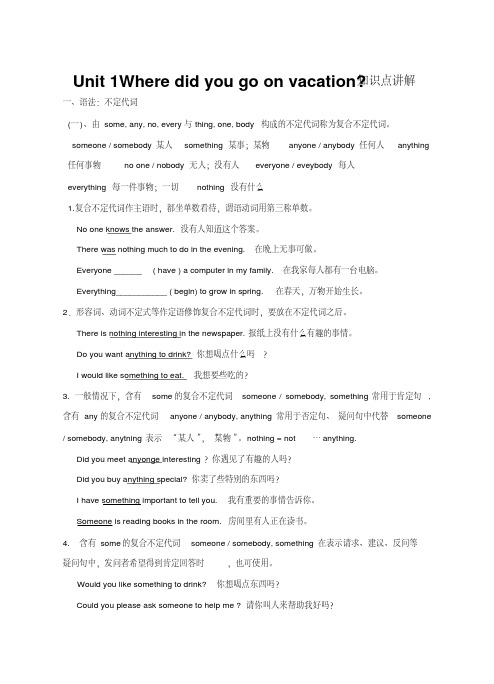
Unit 1Where did you go on vacation?知识点讲解一、语法:不定代词(一)、由some, any, no, every与thing, one, body 构成的不定代词称为复合不定代词。
someone / somebody 某人something 某事;某物anyone / anybody 任何人anything 任何事物no one / nobody 无人;没有人everyone / eveybody 每人everything 每一件事物;一切nothing 没有什么1.复合不定代词作主语时,都坐单数看待,谓语动词用第三称单数。
No one knows the answer. 没有人知道这个答案。
There was nothing much to do in the evening. 在晚上无事可做。
Everyone ______ ( have ) a computer in my family. 在我家每人都有一台电脑。
Everything___________ ( begin) to grow in spring. 在春天,万物开始生长。
2.形容词、动词不定式等作定语修饰复合不定代词时,要放在不定代词之后。
There is nothing interesting in the newspaper.报纸上没有什么有趣的事情。
Do you want anything to drink?你想喝点什么吗?I would like something to eat. 我想要些吃的?3. 一般情况下,含有some的复合不定代词someone / somebody, something常用于肯定句,含有any的复合不定代词anyone / anybody, anything常用于否定句、疑问句中代替someone / somebody, anytning表示“ 某人”,“某物”。
人教版八年级英语上册1-5单元知识点(词汇+句型+固定搭配)

Unit 1 How often do you exercise?词汇:1。
how often:多久一次7. health:健康,12. on weekends:在周末how many: 多少+可数名词healthy:健康的13。
once a week:一周一次2。
always(100%)- 总是unhealthy:不健康,twice a week:一周两次usually(80%)–通常keep/stay healthy three times a month: 一月三次often(60%)—经常= keep/stay in good health:保持健康14。
most: 大部分的,绝大多数的sometimes(40%)- 有时候8. get good grades: 取得好成绩all: 所有的hardly ever(20%)- 几乎不9. the same as:与…不同15。
be good for: 对…有益never(0%) 从不10. a lot of = lots of:大量,许多+ 可数/不可数名词be bad for: 对…有坏处3。
surf the internet: 上网 a lot = very much: 十分,非常,很16。
how many:多少, +可数名词4。
as for: 至于,关于11。
maybe: 也许,大概how much:多少,+不可数名词5。
junk food:垃圾食品may be: 也许是,或许是(may是情态动词,be是动词原形)how much 多少钱,(问价格)6. look after = take care of:照顾12. little: 小的,a little boy: 一个小男孩17。
of course = sure 当然look for: 寻找little: 少,little少→less更少→least最少(修饰不可数名词)look up: 查找(单词、信息)little: 几乎没有,否定词(修饰不可数名词)look at: 看 a little:少许,有一点,肯定词(修饰不可数名词)few:几乎没有,否定词(修饰可数名词)a few少许,有一点,肯定词(修饰可数名词)句型:1.How often do you exercise? →I exercise three times a week. How often does she shop? →She shops once a month.2.What do you usually do on weekends?→I usually watch TV. How often does she watch TV? →She watches TV everyday。
八年级英语上册Unit1

八年级英语上册Unit 1语法(1):复合不定代词或副词的构成及用法构成:由some, any, no, every分别加上-body, -thing, -one.构成的不定代词叫做复合不定代词;即:加上-where构成复合不定副词。
即:用法:(1)复合不定代词在句中可以作主语,谓语动词用单数Everybody (have)a dreamThere (be)nothing wrong with my bikeListen , somebody (sing) in the room(2)something somebody someone some where 通常用于肯定句中;Anything anybody anyone anywhere则多用于否定句、疑问句中。
但something somebody someone some where可用于表请求、邀请、预料对方会作肯定回答时的疑问句中。
常见的有:Nothing nobody nowhere 本身表示否定含义不能和否定词not hardly 等连用everything everybody everyone everywhere 表示全体所有一切的意思根据情况用于肯定句否定句疑问句中(3)形容词修饰不定代词时,通常要放在不定代词之后. 形容词修饰不定代词要后置。
There is something delicious on the table.(4)somewhere, anywhere, nowhere, everywhere用作副词。
Flowers come out everywhere.一用复合不定代词或不定副词填空:1. I can’t hear anything = I can hear ________ _.2. There is _________ on the floor. Please pick it up.3. Did ______ _ go to play basketball with you ?4. I phoned you last night, but ________ answered it.5. Maybe _________ put my pencil _________. I can’t find it ______.6. Could you give me ___________ to eat ?7 there is not __________ in the box it is empty (空的)8 . _________here, no one is away9 . I didn’t find _____ ( someone ) there.10 . Is there ______ _( something ) important in today’s newspaper?三单选1 . No one ________ how to do it.A.knowB. knowsC. knowingD. knew2. Everything_____ OK, isn’t it? A. was B. are C. and D. is3. There’s________in the newspaper. You should read it.A. important somethingB. something boringC. boring somethingD. something important.4.There is _______ in today’s news you don’t need wacth itA. new something B .anything newC . something newD .nothing new13 ---- Did you buy ______ special? ---- No, I didn’t.A. somethingB. some thingsC. anything15 ________ ready now, let’s begin.A.Everything isB.Something are C .Nothing are D.Anything is16.I’m free now, I have _________ to do .A.EverythingB.Something C .Nothing D.Anything语法(2)一般过去时1.一般过去时用法:一般过去时表示过去某时间发生的动作或存在的状态或过去经常性发生的事作,常和过去时间状语连用:yesterday, last night ,two days ago,in 2000, at that time, when 等引导的含过去时的句子。
八年级英语上册第一单元知识点讲解
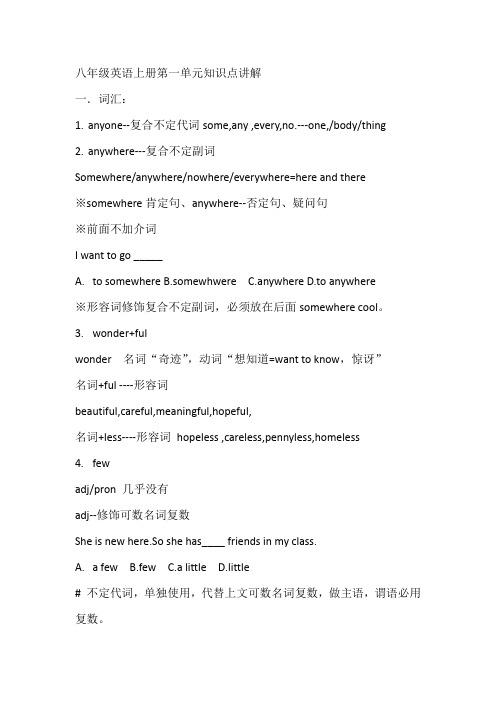
八年级英语上册第一单元知识点讲解一.词汇:1.anyone--复合不定代词some,any ,every,no.---one,/body/thing2.anywhere---复合不定副词Somewhere/anywhere/nowhere/everywhere=here and there※somewhere肯定句、anywhere--否定句、疑问句※前面不加介词I want to go _____A.to somewhereB.somewhwereC.anywhereD.to anywhere※形容词修饰复合不定副词,必须放在后面somewhere cool。
3.wonder+fulwonder 名词“奇迹”,动词“想知道=want to know,惊讶”名词+ful ----形容词beautiful,careful,meaningful,hopeful,名词+less----形容词hopeless ,careless,pennyless,homeless4.fewadj/pron 几乎没有adj--修饰可数名词复数She is new here.So she has____ friends in my class.A. a fewB.fewC.a littleD.little# 不定代词,单独使用,代替上文可数名词复数,做主语,谓语必用复数。
He invited some girls to his party.But ____ came.A. a fewB.fewC.a littleD.littlequite a few相当多,very few 很少,quite a little/very little5.of course=sure/certainly 当然6.myself反身代词#反过来指自己(必须指代上文的人或物)He enjoyed _himself___ yesterday.He only invited the girl__herself__ to the party.#构成:形容词性物主代词+self/selves ourselves,yourselves 第一人称,第二人称yourself人称代词宾格+self/selves 第三人称himself,herself,itself/themselves #主要作宾语,放动介之后。
八年级英语上册 Unit 1 Where did you go on vacation短语、语法知识

Unit 1 Where did you go on vacation一、必背单词短语。
【教材知识点总结】Section A1.Where did you go on vacation? (P. 1)on vacation意为“在度假”,结构“on+名词”表示“在某种状态中”。
例句:My family went to Hainan on vacation last year.2....visited my uncle (P. 1)visit此处用作及物动词,后接人或物做宾语,意为“拜访、看望”,后接表示地点的名词,意为“参观、游览”。
例句:I visited my grandmother last week.例句:Do you want to visit Shanghai?3....go with anyone? (P. 2)(1)anyone用作不定代词,意为“有人、任何人”,相当于anybody,用于疑问句和否定句中,在肯定句中用someone或者somebody。
但是anyone也可以用在肯定句中,表示“任何一个人”。
例句:Did you meet anyone friendly in that city?例句:Anyone can be helpful in some way.(2)anyone只能指人,不可以指物,后面不接of短语;any one既可以指人也可以指物,后可接of短语。
例句:You can ask any one of us about this question.4....buy anything special? (P. 2)(1)buy用作双宾语动词,表示“买”,常用的结构为“buy sb. sth.”或者“buy sth. for sb.”,表示“为某人买某物”。
例句:My father bought me a bike.=My father bought a bike for me.【拓展】可接双宾语的动词还有give, bring, show, tell, sell等。
人教版八年级上册英语Unit 1 知识点语法归纳总结
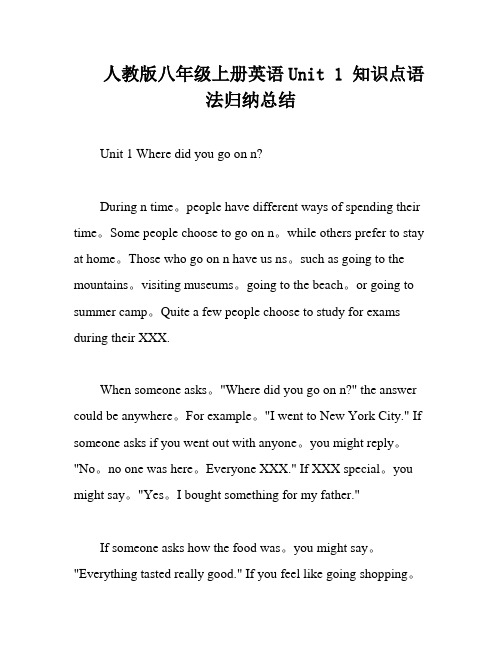
人教版八年级上册英语Unit 1 知识点语法归纳总结Unit 1 Where did you go on n?During n time。
people have different ways of spending their time。
Some people choose to go on n。
while others prefer to stay at home。
Those who go on n have us ns。
such as going to the mountains。
visiting museums。
going to the beach。
or going to summer camp。
Quite a few people choose to study for exams during their XXX.When someone asks。
"Where did you go on n?" the answer could be anywhere。
For example。
"I went to New York City." If someone asks if you went out with anyone。
you might reply。
"No。
no one was here。
Everyone XXX." If XXX special。
you might say。
"Yes。
I bought something for my father."If someone asks how the food was。
you might say。
"Everything tasted really good." If you feel like going shopping。
you might say。
Unit 1 Topic 1 精讲八年级英语上单元重难单词短语句型语法(仁爱版)

同步课堂仁爱版八年级英语上Unit 1 Playing SportsTopic 1 I’m going to play basketball.一、重点词语during在……期间against对着;反对team队,组win 获胜,赢得cheer加油;欢呼,喝彩。
欢呼声,喝彩声practice 练习;实践row划(船)。
一排,一行quite相当,很,十分join加入,参加;连接skate溜冰,滑冰;滑(滑板)tennis网球player运动员;比赛者,选手dream 梦想;梦。
做梦grow成长,生长;发育;种植;变成scientist科学家future 将来musician乐手,音乐家,乐师pilot 飞行员;驾驶员policeman 男警察policewoman女警察postman邮递员,邮差fisherman 渔民;钓鱼的人jump跳跃spend花费(金钱、时间等);度过exercise 锻炼;练习baseball 棒球weekend 周末part 部分;一些;片段health健康;保健popular流行的,大众的,受欢迎的world世界;地球heart 心脏,心healthy健康的,健壮的fit健康的;适合的。
(使)适合;安装relax(使)放松,轻松famous著名的excited 激动的,兴奋的bad令人不愉快的;坏的leave离开;把……留下,剩下。
假期,休假pity遗憾,可惜;同情,怜悯二、词组1. during the summer holidays 在暑假期间2. between…and…在两者之间3. cheer sb. on 为某人加油4. prefer doing sth. 更喜欢做某事5. quite a bit/a lot 很多6. plan to do sth. 计划做某事7. have a skating club 举办滑雪俱乐部8. go skating/ skiing/ bicycling/ climbing/ hiking 去滑雪/滑冰/骑车/爬山/远足9. arrive in 到达10. play against…与……对抗/较量11. for long 很久12. leave for…动身去…13. the day after tomorrow 后天14. places of interest 名胜15. play baseball 打棒球16. at least 至少17. be good at 善于做某事18. take part in 参加19. all over the world 全世界20. be good for 对……有益21. a good way to do sth一种好方法22. keep fit/ healthy 保持健康23. relax oneself 放松某人自己三、重点句型1. What’s your favorite sport? = What sport do you like best? 你最喜爱的运动是什么?2. Which sport do you prefer? = Which sport do you like better?你更喜欢什么运动?3.I prefer skating. = I like skating better. 我更喜欢滑雪.4. Do you skate much? = Do you often skate? 你常滑雪吗?5. She spends at least half an hour in the gym every day.每天她至少花半小时在体育馆.6. She plays baseball pretty well and she is also good at jumping. 她棒球打得相当好而且擅长于跳.7. What kind of sports do you like? = Which sport do you like?你喜欢哪种运动?四、主题课文翻译1a.迈克尔:嗨,康康!康康:嗨,迈克尔!你要去干什么?迈克尔:我要去打篮球。
人教版八年级英语上册第一单元词汇语法
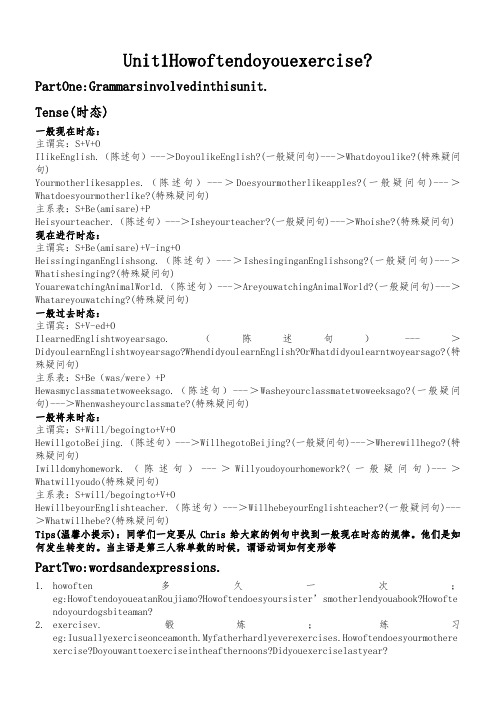
Unit1Howoftendoyouexercise?PartOne:Grammarsinvolvedinthisunit.Tense(时态)一般现在时态:主谓宾:S+V+OIlikeEnglish.(陈述句)--->DoyoulikeEnglish?(一般疑问句)--->Whatdoyoulike?(特殊疑问句)Yourmotherlikesapples.(陈述句)--->Doesyourmotherlikeapples?(一般疑问句)--->))--->)--->>特疑问句)---特)--->)--->Whatwillhebe?(特殊疑问句)Tips(温馨小提示):同学们一定要从Chris给大家的例句中找到一般现在时态的规律。
他们是如何发生转变的。
当主语是第三人称单数的时候,谓语动词如何变形等PartTwo:wordsandexpressions.1.howoften多久一次;eg:HowoftendoyoueatanRoujiamo?Howoftendoesyoursister’smotherlendyouabook?Howofte ndoyourdogsbiteaman?2.exercisev.锻炼;练习eg:Iusuallyexerciseonceamonth.Myfatherhardlyeverexercises.Howoftendoesyourmothere xercise?Doyouwanttoexerciseintheafthernoons?Didyouexerciselastyear?3.skateboardv.踩滑板;滑滑板eg:Heneverskakeboardswithhisfather.Dotheyalwaysskateboardwithus?Idon’tlikeskateb oarding.4.always总是;often常常;usually通常;sometimes有时;hardlyever很少,几乎不;never从来不;once一次;twice两次;threetimes三次;fivetimes五次5.surfv.上网;冲浪Iusuallysurftheinternettwiceaweek.Doyoulikesurfingtheinternet?Mymotherdoesn’tlik esurfingtheinternet.Howoftendoesyoursistersurftheinternet?6.programn.电视等节目;表演Whichprogramdoyoulikebest?NewsExpress(新闻快递)ismyfavoriteprogram.7.highschool;middleschool;中学IamstudyingatNo.1middleschool.8.9.10.;至11.12.13.14.喝15.健康康的老鼠16.17.18.名词;;19.好处的20.试做某事)IamtryinglearningEnglish.(trydoingsth.尝试做某事)Iamtryingnottoplaywithhim.(trynottodosth.尽量不去做某事)21.ofcourse当然,自然“Willyouhelpmewithmyhomework?”“Ofcourse,wearefriends,aren’twe?”22.lookv.看因为look是不及物动词,所以后面如果想跟宾语的话必须接介词。
八年级上册英语第一单元单词知识点

八年级上册英语第一单元单词知识点一、重点单词1. anyone ['eniwʌn] pron. 任何人常用于疑问句和否定句中。
例句:Did anyone call me? 有人打电话给我吗?2. anywhere ['eniweə(r)] adv. 在任何地方常用于疑问句和否定句中。
例句:I can't find it anywhere. 我在任何地方都找不到它。
3. wonderful ['wʌndəfl] adj. 精彩的;绝妙的例句:We had a wonderful time at the party. 我们在聚会上玩得很开心。
4. few [fjuː] adj. & pron. 不多;很少修饰可数名词复数,表示否定含义。
例句:Few people like snakes. 很少有人喜欢蛇。
5. quite a few 相当多;不少例句:I have quite a few friends here. 我在这里有不少朋友。
6. most [məʊst] adj.,adv. & pron. 最多;大多数例句:Most students like sports. 大多数学生喜欢运动。
7. something ['sʌmθɪŋ] pron. 某事;某物常用于肯定句中。
例句:There is something wrong with my bike. 我的自行车出了点问题。
8. nothing ['nʌθɪŋ] pron. 没有什么;没有一件东西例句:I have nothing to do today. 我今天无事可做。
9. everyone ['evriwʌn] pron. 每人;人人;所有人例句:Everyone is here. 大家都在这儿。
10. of course [əv kɔːs] 当然;自然例句:—Can I come? —Of course. —我能来吗?—当然可以。
八年级上册英语知识点归纳-Unit1
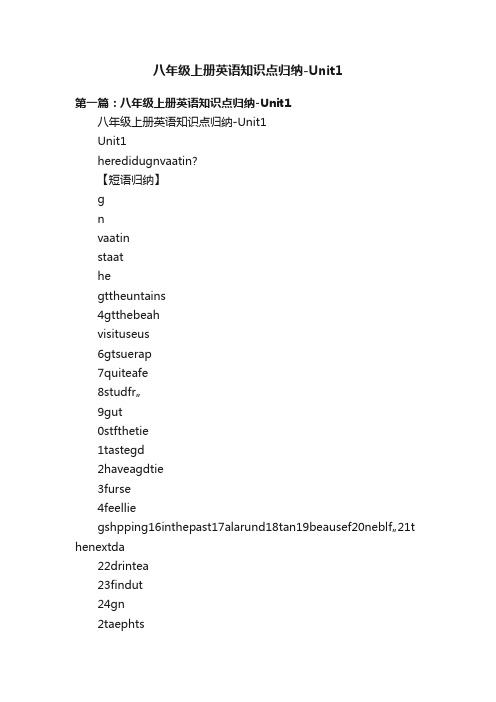
八年级上册英语知识点归纳-Unit1第一篇:八年级上册英语知识点归纳-Unit1八年级上册英语知识点归纳-Unit1Unit1heredidugnvaatin?【短语归纳】gnvaatinstaathegttheuntains4gtthebeahvisituseus6gtsuerap7quiteafe8studfr…9gut0stfthetie1tastegd2haveagdtie3furse4feelliegshpping16inthepast17alarund18tan19beausef20neblf…21t henextda22drintea23findut24gn2taephts26sethingiprtant27upanddn28eup【语法】buanthingspeial买特别的东西①busthfrsb=busbsth②anthing不定代词,意为“某事;某东西”,主要用于疑问句或否定句中。
表示“任何事;任何东西”时,主要用于肯定句。
③anthingspeial特别的东西,形容词修饰不定代词时应后置Hdidulieit?你觉得它怎么样?=hatduthinf…?Didugshpping?你们去购物了吗?g+ding表示去做某事,常用于表达从事某一体育活动或休闲活动gfishinggsiing…Thenlprbleasthatthereasnthinguhtdintheeveningbutread唯一的问题是晚上除了读书没什么事情可做。
Nthinguhtd没什么事可做nthing…but…除…之外什么也没有,but后可接名词或动词原形。
Stillnneseeedtbebred仍然没有人看起来无聊see可作不及物动词或连系动词,意为“好像,似乎,看来”see+形容词看起来。
useehapptdasee+tdsth似乎,好像做某事IseethavealdItsee/seeed+从句看起来好像。
人教版初中英语八年级上册英语知识点归纳总结复习(单词、短语、句子、语法、练习)
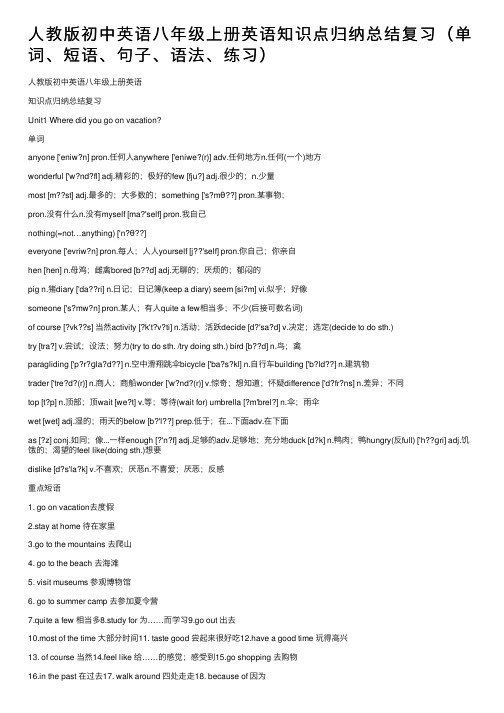
⼈教版初中英语⼋年级上册英语知识点归纳总结复习(单词、短语、句⼦、语法、练习)⼈教版初中英语⼋年级上册英语知识点归纳总结复习Unit1 Where did you go on vacation?单词anyone ['eniw?n] pron.任何⼈anywhere ['eniwe?(r)] adv.任何地⽅n.任何(⼀个)地⽅wonderful ['w?nd?fl] adj.精彩的;极好的few [fju?] adj.很少的;n.少量most [m??st] adj.最多的;⼤多数的;something ['s?mθ??] pron.某事物;pron.没有什么n.没有myself [ma?'self] pron.我⾃⼰nothing(=not…anything) ['n?θ??]everyone ['evriw?n] pron.每⼈;⼈⼈yourself [j??'self] pron.你⾃⼰;你亲⾃hen [hen] n.母鸡;雌禽bored [b??d] adj.⽆聊的;厌烦的;郁闷的pig n.猪diary ['da??ri] n.⽇记;⽇记簿(keep a diary) seem [si?m] vi.似乎;好像someone ['s?mw?n] pron.某⼈;有⼈quite a few相当多;不少(后接可数名词)of course [?vk??s] 当然activity [?k't?v?ti] n.活动;活跃decide [d?'sa?d] v.决定;选定(decide to do sth.)try [tra?] v.尝试;设法;努⼒(try to do sth. /try doing sth.) bird [b??d] n.鸟;禽paragliding ['p?r?ɡla?d??] n.空中滑翔跳伞bicycle ['ba?s?kl] n.⾃⾏车building ['b?ld??] n.建筑物trader ['tre?d?(r)] n.商⼈;商船wonder ['w?nd?(r)] v.惊奇;想知道;怀疑difference ['d?fr?ns] n.差异;不同top [t?p] n.顶部;顶wait [we?t] v.等;等待(wait for) umbrella [?m'brel?] n.伞;⾬伞wet [wet] adj.湿的;⾬天的below [b?'l??] prep.低于;在...下⾯adv.在下⾯as [?z] conj.如同;像...⼀样enough [?'n?f] adj.⾜够的adv.⾜够地;充分地duck [d?k] n.鸭⾁;鸭hungry(反full) ['h??ɡri] adj.饥饿的;渴望的feel like(doing sth.)想要dislike [d?s'la?k] v.不喜欢;厌恶n.不喜爱;厌恶;反感重点短语1. go on vacation去度假2.stay at home 待在家⾥3.go to the mountains 去爬⼭4. go to the beach 去海滩5. visit museums 参观博物馆6. go to summer camp 去参加夏令营7.quite a few 相当多8.study for 为……⽽学习9.go out 出去10.most of the time ⼤部分时间11. taste good 尝起来很好吃12.have a good time 玩得⾼兴13. of course 当然14.feel like 给……的感觉;感受到15.go shopping 去购物16.in the past 在过去17. walk around 四处⾛⾛18. because of 因为⼀碗…… 20. the next day 第⼆天21. drink tea 喝茶19. one bowl of… 22. find out 找出;查明23. go on 继续24.take photos 照相25. something important 重要的事26. up and down 上上下下27. come up 出来28. buy sth. for sb. / buy sb. sth. 为某⼈买某物29. taste + adj. 尝起来…… 动词原形除了……之外什么都没有30. look+adj. 看起来…… 31.nothing…but+32.seem+(to be)+ adj. 看起来…… 33. arrive in+⼤地点/ arrive at+⼩地点到达某地34.decide to do sth. 决定去做某事35. try doing sth. 尝试做某事/ 36. try to do sth. 尽⼒去做某事37. forget doing sth. 忘记做过某事/ 38. forget to do sth. 忘记做某事39. enjoy doing sth. 喜欢做某事40. want to do sth. 想去做某事41. start doing sth. 开始做某事42. stop doing sth. 停⽌做某事43. dislike doing sth.不喜欢做某事44. keep doing sth. 继续做某事45. Why not do. sth.? 为什么不做……呢?46. so+adj.+that+从句如此……以⾄于…… 47. tell sb. (not) to do sth. 告诉某⼈(不要)做某事48 .have a good time=enjoy oneself=have fun(doing sth.)玩得痛快三、重点句⼦:1. Where did you go on vacation? 你去哪⼉度假的?2. Long time no see. 好久不见。
人教版八年级上册英语单词及语法.doc

20XX年最新人教版八年级上册英语单词及语法Unitl where did you go on vacation?单词anyone ['eniwAn] pron.任何人anywhere ['eniwea(r)] adv.任何地方n.任何(一个)地方wonderful ['wAndsfl] adj.精彩的;极好的few [fju:] adj.彳艮少的;n.少量most [msost] adj.最多的;大多数的;something ['sAmOig] pron.某事物;nothing(=not...anything) ['nA0ir]] pron.没有什么n.没有myself [mai'self] pron.我自己everyone ['evriwAn] pron.每人;人人yourself [j3:'self] pron.你自己;你亲自hen [hen] n.母鸡;雌禽bored [to:d] adj.无聊的;厌烦的;郁闷的pign.猪diary ['daiari] n.日记;日记簿(keep a diary) seem [si:m] vi.似乎;好像someone ['sAmwAn] pron.某人;有人quite a few 相当多;不少(后接可数名词)of course [svkois] 当然activity [aek'tivsti] n.活动;活跃decide [di'said] v.决定;选定(decide to do sth.)try [trai] v.尝试;设法;努力(try to do sth. /try doingsth.)bird [b3:d] n.鸟;禽paragliding ['pseraglaidirj] n.空中滑翔跳伞bicycle ['baisikl] n.自行车building ['bildirj] n.建筑物trader ['treida(r)] n.商人;商船wonder ['wAnda(r)] v.惊奇;想知道;怀疑difference ['difrsns] n.差异;不同top [top] n.顶部;顶wait [weit] v.等;等待(wait for) umbrella [Am'brela] n.伞;雨伞wet [wet] adj.湿的;雨天的below [bi'lau] prep.低于;在…下面adv.在下面as [sz] conj.如同;像...一样enough fi'nAf] adj.足够的adv.足够地;充分地duck [dAk] n.鸭肉;鸭hungry(反full) ['hArjgri] adj.饥饿的;渴望的feel like(doing sth.)想要dislike [dis'laik] v.不喜欢;厌恶n.不喜爱;厌恶;反感because of因为;由于have a good time=enjoy oneself=have fun(doing sth.)玩得痛快短语go on vacation 去度假stay at home 待在家里go to the mountains 去爬山go to the beach 去海滩visit museums 参观博物馆go to summer camp 去参观夏令营quite a few相当多study for为........... 而学习go out出去most of the time大部分时间taste good尝起来很好吃have a good time玩得高兴of course当然feel like给的感觉;感受到go shopping去购物in the past在过去walk around四处走走because of 因为one bowl of…一碗the next day 第二天drink tea 喝茶find out 找出;查明go on 继续take photos 照相something important 重要的事up and down 上上下下come up出来buy sth. for sb. / buy sb. sth.为某人买某物taste + adj.尝起来............. look+adj.看起来....... nothing •••. but+动词原形除了.... 之外什么都没有seem+ (to be) + adj.看起来.........arrive in+大地点/ arrive at小地点到达某地decide to do sth.决定去做某事try doing sth.尝试做某事/ try to do sth.尽力去做某事forget doing sth.忘记做过某事/ forget to do sth.忘记做某事enjoy doing sth.喜欢做某事want to do sth.想去做某事20XX年最新人教版八年级上册英语单词及语法start doing sth.开始做某事stop doing sth.停止做某事dislike doing sth.不喜欢做某事keep doing sth.继续做某事Why not do. sth.?为什么不做..... 呢?so+adj.+that+从句如此...... 以至于 ..tell sb. (not) to do sth.告诉某人(不要)做某事Unit2 How often do you exercise?单词housework ['haosw3:k] n.家务劳动hardly ['ha:dli] adv,几乎不;简直不;刚刚ever ['eva(r)] adv.曾经;在任何时候once [wAns] adv. 一次;曾经twice [twais] adv.两倍;两次Internet ['mtanet] n.因特网program ['prsogrsem] n.节目;程序;课程;节目单full [fol] adj.满的;充满的;完全的swing [SWIQ] n.摇摆;秋千v.摇摆;旋转maybe ['meibi] adv.或许;也许;可能swing dance摇摆舞least [li:st] adj.最小的;最少的at least至少hardly ever很少;几乎从不;难得junk n.垃圾;废旧杂物coffee ['kofi] n,咖啡;咖啡色health [hel0] n.健康;人的身体或精神状态result [n'zAlt].结果;后果percent [ps'sent] adj.百分之…的online [^n'lam] adj.在线的adv.在线地television ['telivijn] n.电视机;电视节目although [。
- 1、下载文档前请自行甄别文档内容的完整性,平台不提供额外的编辑、内容补充、找答案等附加服务。
- 2、"仅部分预览"的文档,不可在线预览部分如存在完整性等问题,可反馈申请退款(可完整预览的文档不适用该条件!)。
- 3、如文档侵犯您的权益,请联系客服反馈,我们会尽快为您处理(人工客服工作时间:9:00-18:30)。
大家好
6
? 10. My healthy lifestyle helps me get good grades .
我健康的生活方式帮助我取得好的成绩。
help sb.(to) do sth. 帮助某人做某事
She often helps me learn math. 她经常帮助我学数学。
How often do you play tennis?
How often do you surf the Internet.
(5) How old...? 询问年龄 How old a大re家好you? I am five.
1
(6) How about…? …… 如何? ……怎么样? How about going to the movies?
I'll try to learn English well. 我会尽量尝试学好英语的。
You must try to take more exercise.
你必须尽量多做运动。
? 9. I look after my health. look after 照顾
My brother is ill. I have to look after him today.
How much water do we drink every day?
How much are those pants?
(4) how often 是对动作发生的“次数”提问 ,询问的是
频率“多久一次”
回答可以是:Every day. / Once a week. / Three times a week. / Often. / ...
There are many shops in the neighborhood. 4. as for 意为“就……而论”,“至于”
As for fruit ,I eat it sometimes. As for him ,I never want to see him here. 至于他,我永远不希望在这里见到。
? I want you to help me with my math.
我想要你帮我学数学。
? 有很多动词后面用这种结构做动词的复合宾语:
ask sb. to do sth. 叫某人做某事
tell sb. to do sth. 告诉某人去做某事
help sb. (to)状况) How are you?
(3) how many ,how much 表示“多少”
how many 后接可数名词复数,how much 接不可数名词。
How many times do you go to the park?
How many pens do you want?
? 表示“……几次”的表达方法是:
once a day/ a week/ a month/ a year
twice a day/ a week/ a month/ a year
大家好
2
3. exercise v/n shop v/ n He often exercises on weekends. We often do / take exercise on weekends. We often shop on weekends.
大家好
3
5. My mother wants me to drink it.
我妈妈想要我喝。
? want to do sth. 想要做某事
want sb. to do sth. 想要某人干某事
Do you want to go to the movies with me ?
你想和我一起去看电影吗?
Unit1 How often do you exercise?
1. 疑问词how 的用法
怎样,用什么手段,方法/交通工具
How are you? / How is she?
How did he do it? / I don't know how to swim.
How do you come to school?
我的弟弟病了。我今天不得不照顾他。
All the students must look after the desks and chairs. 所有的学生必须照看好课桌椅。
He often helps his mother look after his little sister.
他经常帮助他的妈妈照顾他的小弟弟。
大家好
5
7. usually when I come home from school
通常是在我从学校回家时
When + 从句 当……时候
I often stay at home when it is rainy.
? 8. I try to eat a lot of vegetables.
try to do sth. 尽量/尽力做某事
? time 表示不可数名词,意为“时间”。 表示 可数名词,意为“次数,倍数”
What time is it?
I go to the movies three times a week.
? 注意“次数”的表达方法
一次 once , 两次 twice ,
三次或三次以上用基数词加上times :
three times 、five times 、one hundred times.
大家好
4
6. She says it's good for my health . 她说它对我的健康有意。
? be good for... 表示“对 ……有益(有好处)” 其反义为: be bad for... 对……有害/无益 It's good for us to do more reading. 多读书对我们有好处。 Drinking milk is good for your health. 喝牛奶对你的健康有益。 Reading English is good for studying English. 对英语对学习英语有益 /有帮助。 Reading in bed is bad for your eyes. 在床上读书对你的眼睛有害。
